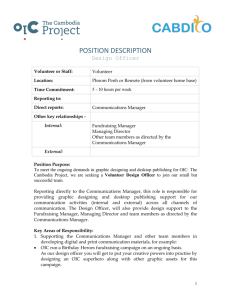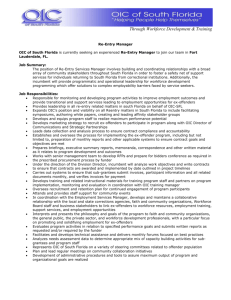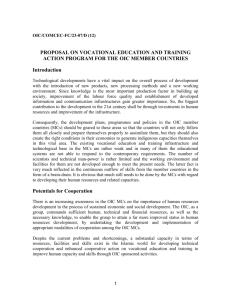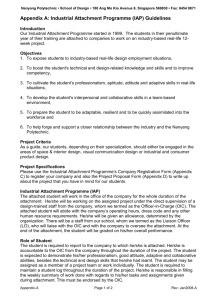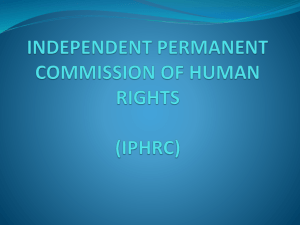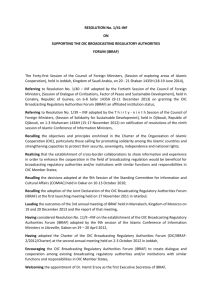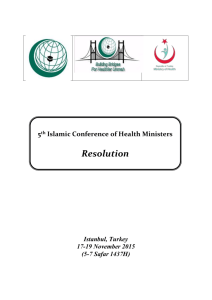Range 118 - Army Guru
advertisement
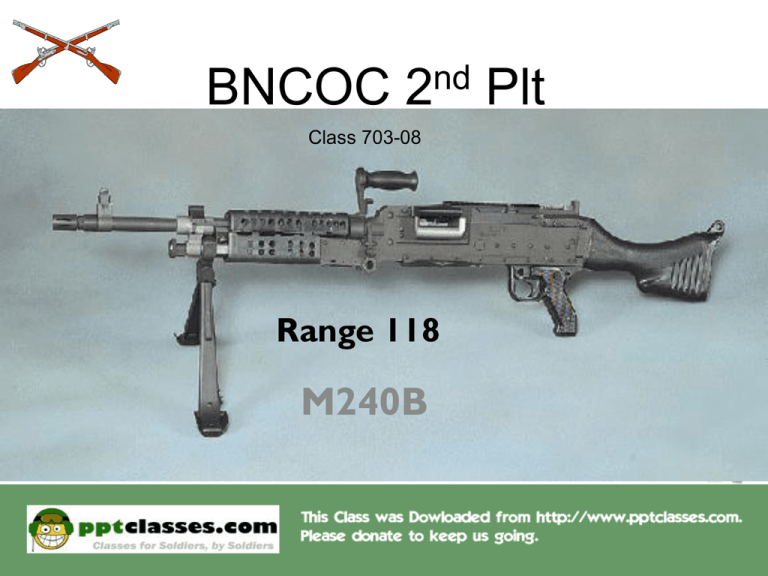
BNCOC nd 2 Class 703-08 Range 118 M240B Plt Task Organization • Assets: BNCOC Class 703-08 consisting of 71 personnel, 6 SGL’s, 7 MG’s, 1 FLA, 2 Medics, 1 Retention NCO, 1 Gut Truck • Terrain Analysis: Terrain consists of wooded rolling hills. The range is cleared of trees but may have small shrubs and bushes. Most likely avenue of approach will be by one main road. Situation 1. Enemy Forces: Range Control 2. Enemy Composition: 20 or more Range Control personnel, whose primary mission is to run interference with our range through decertification of the range. They travel in SUV’s or in thin skinned vehicles with Range Control mark on the side. Range Control may travel in pairs in one vehicle. Their probable course of action will be to ambush the OIC at the range tower and decertify him. 3. Friendly Forces: We will have a two man observation point at the front gate to give early warning. The OP will have two Motorola's to communicate with OIC. The “Gut” truck will be conducting roving patrols in the AO. 4. Adjacent Units: The 7th ATC NCO Academy will be to the east in Camp Normandy. 2nd ACR will be to the south of Range 118. Mission • BNCOC Class 703-08, 2nd Platoon, conducts M240B machine gun familiarization range at Grafenwoehr, Range 118, NLT 270800FEB08 IOT familiarize students with the weapon system and capabilities enabling them to instruct their soldiers and conduct future range operations. Execution Commanders Intent - To ensure that all students in class 703-08 are familiar with the operations of the M240B Machine Gun. - Platoons will conduct PMI classes on the M240B on 261800FEB08. • SSG Jack will instruct PMI on M240B to consist of bore light, optics, proper loading, misfire, clearing and maintenance procedures. - 2nd Platoon will be in charge of all range details and all personnel will comply with 2nd BCT uniform standards consisting of ACH, IBA w/ ammo pouches and SAPI plates, eye pro, knee pads and elbow pads (inserts), ear plugs, first aid kit and tactical firing gloves. Commanders End State - That all BNCOC students are proficient in the Operations of the M240B Machine Gun with optics. Concept of Operations: M240B Machine Gun range will begin 270800FEB08 and end 271200FEB08. All students will participate in running the range. Each student will shoot 160 rounds through the M240B Machine Gun, also conducting concurrent training led by SSG Jack. Execution Cont. TASK AND MANEUVER UNITS 1. 2nd PLT will be tasked to provide the OIC, which will be SSG Cunningham, who task and purpose is to conduct a range recon, supervise the setup of the range, signs for the range and equipment, requests range status’s through Range Control, and ensures the policing of the range at the end of firing. For additional duties see Annex 1. 2. 2nd PLT will be task to provide the RSO, SSG Knorr task and purpose is to supervise the overall safety and conduct of the range, briefing the guards, inspect all ammunition, and ensure all weapons systems are clear at the end of firing. For additional duties see Annex 1. 3. 2ND PLT will be tasked to provide the NCOIC, SGT Nickerson, whose task and purpose is to set up concurrent training, ensure all details are being completed, and the policing of the range at the end of firing. Execution Con’t 4. 2nd PLT. Will conduct PMI on all 240B’s. SSG Jack will be in charge. 5. 2nd PLT. Will be in charge of all range details, including 2 safety personnel, and 3 gate guards. SSG Gabriel will be in charge as the Assistant RSO. Safety personnel: -SGT Landry -SSG Rausch -SSG Richey Gate Guards: -SGT Wright -SGT Hall -SSG Mahoe 6. 2nd PLT will be in charge of ammo detail. SSG Nunez will be in charge. Ammo Detail: -SSG Nunez -SSG Gonzalez -SGT Lelauti -SSG Lesco Service and Support A. General: Company trains location will be at Camp Normandy. Casualty collection point will be at the FLA located near the base of the control tower. Damaged weapons will be collected at the ammo point. Route for MEDEVAC is in ANNEX 2. Additional support will be provided by 2nd BCT and 7th NCO Academy. B. Material and Services: 1) Supply. Class I: 13x (cases) MRE’s, 3x Soup mermite’s, 4x Coffee, 2x (box) sugar, 2x (box) creamer, 200x cups, 200x utensils. 1x Water buffalo. Class II: 2x ACEP radios, 7x Hand held radios, 1x Bullhorn, 1x Dry Erase Board w/ markers, 5x clipboards, 1x range brief, 1x safety brief, 2x range bulletin, 2x GTA SOP 1, 2x FM 3-22.68, 1x TM 9-1005-313-10, 1x TM 9-1005-31323&P, 1x FT 7.62-A-2, 1x DA PAM 385-63, 10x DA Form 1594, 21x DA Form 1059, 6x M240B Offset (Iron sight), 6x M240B Offset (M145), 10x trash bags, 10x toilet paper, 1x 550 cord (roll), 1x VS-17 panel, 96x AA batteries, 6x M22 binoculars, 6x M240 B machine guns, 6x M145 sights, 6x M122 tripods w/ pintle, 6x T&E, 6x M240B spare barrels, 10x red chem lights, 6x Bore light kits (complete), 3x fire extinguishers. Class III: 2x (gallons) CLP, 5x CLP spray bottles. Class IV: 50x sand bags, 1x engineer tape (roll), 3x shovel, 5x pallets. Class V: 50x M172 Dummy rounds, 13552x 7.62 Ammunition, DODIC A151 4:1 Mix, 2x red parachute flare. Class VI: 4x hand soap, 6x hand sanitizer. Class VII: 2x 40 pax. Busses, 1x TMP, 1x FLA w/ radios. Class VIII: 2x Aid bags, 2x CLS bags, 2x certified medics, 1x ear protection (box). Class IX: 6x Front Sight Post Adjustment Tool, 1x small arm repair kit. Service and Support B. Material and Services (CONT’D): 2) Transportation: Transportation to and from the range for students will be 2x 40 passenger busses. 1x TMP has been requested for range personnel and individual emergencies. 1x FLA is requested for real world casualties. 3) Services: Laundry and shower services will not be available at the range. 4) Maintenance: Weapons maintenance will be conducted at the 10 level on the range. Any further maintenance needed will be supported by 299th PSB. a) Medical Evacuation and Hospitalization: Refer to ANNEX 2. b) Personnel Support: Range control will be treated with the upmost respect. They will be completely informed by the OIC on how the range is being conducted. This operation will occur in the range tower. Command and Signal A. Command - OIC will be in tower, RSO and NCOIC will be located on ground. - Succession of command will be SSG CUNNINGHAM, SSG KNORR, SGT NICKERSON, SSG FAHIE, SSG RICHEY, SSG NUNEZ, SSG HAMILTON, SSG EAKINS, SSG LESCO, SSG GABRIEL, SSG MAHOE, SSG GONZALEZ, SSG JACK, SGT LANDRY, SGT AVILA, SGT WRIGHT, SSG LELAUTI, SSG RAUSCH, SGT HALL B. Signal – Landline primary from communication with RC, alternate is FM, no SOI needed. – Direct Fire Net: Primary: 55.000 Alternate: 48.000 – Indirect Fire Net / Admin Safety Net / MEDEVAC: Primary: 60.000 Alternate 82.000 - Call Signs will be issued IAW GTA SOP - Hand and arm signals for cease fire - Red parachute flare for real world casualties - VS17 Panel for MEDEVAC and marking of LZ - No code words or number combination needed - Range status signals. Display a red range flag on the flagpole at all times when a range is in a "WET" status. At night, the red flag is replaced with a flashing red beacon. TIMELINE • • • • • • • • • • • • • • • • • • • • • • • • 250530FEB08- WEAPONS DRAW AND CHOW 250745FEB08- LOAD BUSSES 250800FEB08- MOVEMENT TO GRAF 251020FEB08- OCCUPY BARRACKS AND CHOW 251230FEB08- DAY LAND NAVIGATION 251800FEB08- CHOW 251830FEB08- NIGHT LAND NAVIGATION 252230FEB08- REST PLAN 260610FEB08- WEAPONS DRAW AND CHOW 260800FEB08- SQUAD WEAPON MARKSMANSHIP 261200FEB08- CHOW 261300FEB08- FBCB2 TRAINING 261730FEB08- CHOW 261800FEB08- PMI AND WEAPONS MAINTENANCE 261830FEB08- WEAPONS TURN-IN 261900FEB08- REST PLAN 270610FEB08- WEAPONS DRAW AND CHOW 270700FEB08- MOVEMENT TO RANGE 118 / AMMO Drop 270800FEB08- FIRST ROUND DOWN RANGE 271200FEB08- RANGE CLOSURE AND CHOW 271300FEB08- FBCB2 TRAINING 271700FEB08- CHOW 271800FEB08- WEAPONS MAINTENANCE AND TURN-IN 271900FEB08- REST PLAN ANNEX 1 5. OIC / RSO RESPONSIBILITIES. a. General. (1) OICs are responsible for maintaining overall supervision of the scheduled facility and all personnel present at the facility. The OIC must adequately brief the RSO and all unit personnel on safety and other applicable administrative instructions before training. (See checklist on page C-37). (2) The OIC occupies the range IAW this SOP immediately upon arrival at the range. The current Range Bulletin and risk assessment must be on-site. Once the range is occupied, the OIC may not leave until the range is placed in a GUARD status or CLEAR status from the Firing Desk. OICs and RSOs will not sleep or perform any other duties while in a WET status. OICs/RSOs will not participate in training. The OIC/ SOG must always be available to respond to Range Operations via the primary means of communication within two minutes. While on direct fire facilities, the OIC must be available to respond via landline. While on indirect fire facilities, the OIC must be available to respond via FM radio communications. (3) The OIC briefs the medic and ambulance driver in accordance with paragraph 19 and 20 of SOP #1 providing them a strip map depicting the route to the closest clinic from the facility. (4) When a range is in a WET, OCCUPIED, or GUARD status, a responsible individual must monitor the Range Safety Net at all times. This individual has the authority to place a WET range into a cease fire status when required. (5) The OIC positions himself and the RSO where they can effectively control and monitor firing on the range. When a facility has an assigned location or area for the OIC / RSO, indicate this during the safety briefing. (6) OICs must be alert and ready to respond to any emergencies. For example, when “Cease-FireFreeze” is announced, the OIC ensures the weapon(s) is / are placed on mechanical safe, vehicle is stopped in place if moving and the weapon / fire control system is / are not touched. The weapon / vehicle may not be moved and the firer / crew is removed from the weapon system. If the Cease-Fire-Freeze was not initiated by Range Operations, the OIC is responsible to contact Range Operations within fifteen (15) minutes after initiation. Failure to comply with this is grounds for decertification. The OIC must provide situational updates every 30-min. until Range Operations personnel arrive on site. (7) Each live-fire facility must have a separate OIC and RSO. Ranges where terrain features or distance inhibit a single RSO’s ability to control all firing elements require additional RSOs. ANNEX 1 CONT. 2. OIC / RSO REQUIREMENTS AND RESPONSIBILITIES. a. For OIC and RSO requirements refer to this SOP, Annex C. b. OICs / RSOs are prohibited from performing any other duties. They will not participate in any training while serving as OIC / RSO. c. While the range is in a "OCCUPIED / DRY/ WET" status the OIC must remain on the range and available to respond to telephonic and radio calls from Range Operations within 2 minutes via the Direct Fire Safety Net (55.000). If the OIC must leave the range, the unit either changes OIC or the range must go into a guard status. d. The OIC must occupy with the Range Operations Firing Desk. If there is a change of OICs, Range Operations must be notified. e. The OIC must ensure there are qualified medical personnel on the range and that they meet all requirements IAW this SOP. f. Any additions / changes to the unit’s OIC roster must be submitted to the appropriate branch on a memorandum signed by the Battalion / Squadron commander. g. The OIC is responsible for the entire range complex (i.e., administrative areas, motor park, ammunition point, and the tactical assembly / maneuver areas). h. The OIC must brief all personnel on the safe conduct of both day and night firing and any administrative instructions. i. The OIC ensures that all range limit markers are visible to firers and unit control personnel before commencing live-fire operations on it. For longer segmented ranges such as 305, 307, 201, 211, 213 personnel need only have visibility to limit markers on that portion of the range on which they are currently training. Mechanized ranges and ranges using vehicles or personnel equipped with thermal / FLIR optics meet this requirement as long as the crews/firing personnel AND control personnel have the equipment and can observe the firing limits. For JMRC Live-Fire exercises, the Senior Observer-Controller determines acceptable visibility standards. j. The OIC must know and comply with the current Fire Condition (FIRECON) status described in Annex C of this SOP. k. The OIC must perform all duties and actions IAW FM 3-20.12 (Tank Gunnery), FM 3-22.1 (Bradley Gunnery), FM 3-22.3 (Stryker Gunnery), weapon specific FMs / TMs, AR 385-63, DA PAM 385-63 and applicable SOPs and non-standard training overlay deviation restrictions. l. The OIC must ensure all personnel use adequate hearing protection. m. The OIC must ensure that vehicles do not leave the course roads and pivot steer only on concrete hard stands located behind each battle position. n. The OIC must not deviate from the approved PCU or approved overlay scenario. o. At the conclusion of training the OIC must ensure that: (1) All weapons systems are cleared and small arms are rodded or otherwise cleared off the range. AEAGC-TD-GTA (2) Misfires are disposed of properly and Range Operations has been informed of munitions that require EOD assistance. Units must maintain positive control of misfired HE munitions until disposed of by QASAS or EOD. (3) All wire, to include commo wire, concertina wire, and wire from guided missiles (TOW, etc.) is recovered and removed from the range. Range crews can provide a TOW wire spooler. (4) All range deficiencies are reported to the range crew and appropriate branch. (5) An inspection of the range by the Range Foreman is coordinated and performed IAW this SOP f. Ammunition is properly organized and guarded IAW SOP #10, Ammunition Surveillance Training Support. g. The OIC must occupy the range IAW this SOP. h. Units must inform Range Operations within one hour of occupation if the facility is in an unacceptable state of police from the previous unit. After one hour of occupation, or if the previous unit has departed GTA, the unit accepts responsibility for the police of the facility. i. Range status signals. Display a red range flag on the flagpole at all times when a range is in a "WET" status. At night, the red flag is replaced with a flashing red beacon. Range barriers must be closed and only authorized personnel are allowed entry. Training units are responsible to establish a guard for entry / access control when any direct fire range (to include all types of grenade ranges) is in a WET status. ANNEX 2 MEDICAL EVACUATION PROCEDURES. The following paragraphs outline detailed medical evacuation procedures. All OICs and medical personnel must be thoroughly familiar with these procedures. Soldiers transported for normal sick-call are not reported unless the injury/sickness was a direct result of an accident / incident. Unit medics diagnose a patient's condition and determine extent of injuries. If air evacuation is not required, ground evacuate IAW paragraph 20.c below. If the senior ranking person or a trained medic determines helicopter evacuation and / or the presence of a physician is required, follow air MEDEVAC procedures in paragraphs 20.d-i below. a. Units follow accident / incident reporting procedures outlined in para 11, and appropriate DA and AE regulations. b. Do not transfer equipment, sensitive items or ammunition with medical evacuation patients. The unit must retain and secure these items. c. Ground Medical Evacuation. (1) Wheeled Ambulance: Proceed to Grafenwoehr / Vilseck Clinic IAW strip map during normal clinic duty hours (below). Training units must notify the Grafenwoehr / Vilseck Clinic before any transport to the clinic or to the Klinikum Weiden or any other German facility. When the clinic is open, call 475-5316. After normal duty hours, the Patient Liaison may be reached through the MP desk: 475-8319. It is critical that the Patient Liaison is notified as soon as possible after a decision to transport to a German hospital has been made. Sample strip maps are on pages C-38 & 39. The Klinikum Weiden strip map is also available across from the Range Operations Firing Desk. Grafenwoehr Health Clinic hours are: Monday – Wednesday: 0700-1930 Thursday: 1300-1930 Friday: 0700-1500 Saturday: 0900-1200 Training Holidays 0900-1200 (2) Tracked Ambulance: Proceed via tank trail to the Clinic (see page C-38) during normal clinic duty hours. At all other times, a unit must transfer the patient(s) to wheeled ambulance and proceed to the Klinikum Weiden IAW strip map (page C-39). Only wheeled vehicles can be used as ground evacuation vehicles when the clinic is closed. d. Air Medical Evacuation. Transmit all air MEDEVAC requests to Range Operations via FM radio (60:000) or landline (475-6332 / 6122). Units are not authorized to contact MEDEVAC directly. Submit the following information to Range Operations: (1) Line 1: LOCATION - Grid coordinates of landing zone to include grid zone designation (PA or QA). (2) Line 2: GTA assigned ALPHA CALL SIGN. (3) Line 3: PRECEDENCE a - Urgent (immediate) b - Priority (4 hours) c - Routine (24 hours) (4) Line 4: SPECIAL EQUIPMENT REQUIRED a-None b-Litter c-Hoist d-Medical Officer e-Stokes (5) Line 5: NUMBER OF PATIENTS BY TYPE a - Litter b - Ambulatory (6) Line 6: NUMBER AND TYPE OF INJURY: Specific information regarding patient wounds by type (shrapnel, bullet wound, etc.). Report serious bleeding along with blood type if known from ID tags. (7) Line 7: METHOD OF MARKING LANDING ZONE a - Wood or stones piled b - Signal lamp, flash light or strobe light c - Vehicle lights d - Open flames e - Panels f - Pyrotechnics g - Smoke h -Person i - Strips (8) Line 8: NATIONALITY AND STATUS a - U.S. military b - U.S. civilian c - Non U.S. military d - Non U.S. civilian e. If a unit requests aero medical evacuation, Range Control obtains MEDEVAC helicopter support for the unit and performs the following actions: (1) Places "WET" facilities into a cease fire status to allow expeditious routing of the MEDEVAC helicopter, as follows: "ALL STATIONS, THIS NET; ALL STATIONS, THIS NET; CEASE FIRE FREEZE, CEASE FIRE FREEZE, CEASE FIRE FREEZE FOR MEDEVAC. THIS NET IS NOW CLOSED EXCEPT FOR EMERGENCY TRAFFIC ONLY. ALL STATIONS FIRING MUST CONTACT THIS STATION IMMEDIATELY VIA LAND LINE TO CONFIRM THEIR DRY STATUS. ALL INDIRECT FIRE UNITS MUST CHANGE TO FREQUENCY 60.000 AND CONFIRM THEIR DRY STATUS. THIS NET AND LANDLINE ARE NOW CLOSED EXCEPT FOR EMERGENCY TRAFFIC. THIS IS RANGE CONTROL OUT.” (2) Maintain control / communications with the MEDEVAC helicopter. (3) Notify appropriate agencies and relay messages as required. f. Estimated Air MEDEVAC Reaction Time is 20-30 minutes. g. Communicate with MEDEVAC aircraft on Range Safety Net (60.000). If ground personnel have visual contact with the helicopter and the pilot states he/she cannot see the LZ, ground personnel should communicate the location to the pilot. h. The unit requesting MEDEVAC must select and properly mark a helicopter landing zone. The following permanent landing sites are preferred, but not required. Range 117 Old QA 0836 0863 Helipad New QA 0910 0804 Helipad Range 118 QA 0872 0725 Helipad Range 132 QA 0818 0344 Helipad Range 201 PA 9760 0724 Helipad (2) Range 204 QA 0065 0434 Marked Field Range 211 PA 9303 0067 Helipad Range 213 PA 9125 0518 Helipad Range 301 PA 9575 1075 Helipad (2) Range 305 PA 9898 1328 Helipad Grafenwoehr FARP QA 1101 0833 Multiple Pads Strip QA 1187 0822 Unmarked Field Range 301 FARP PA 9516 1197 Multiple Pads Vilseck AAF/FARP PA 9954 0167 Multiple Pads (Closed due to force protection from 0600-0900, Monday-Friday) Graf MEDEVAC Pad QA 1023 1025 Helipad Vilseck MEDEVAC Pad QA 0176 0228 Helipad i. Only aero medical evacuation aircraft perform air medical evacuation. Aviation unit aircraft are not authorized to evacuate patients. MEDEVAC REQUEST PROCEDURES FIRING DESK DSN 475-6332/6122 FM 60:000 Grafenwoehr Fire and Emergency Service DSN 475-8303 BW Liaison ADAC DSN 475-6118 Reference AR 95-3 Resource Chart DESCRIPTION QTY Range 118 (Complete) 1 ACEP Radios 2 Hand Held Radios 7 Bullhorn 1 Dry Erase Board w/ markers 1 Clipboards 5 Range Brief 1 Safety Brief 1 Range Bulletin 2 GTA SOP 1 2 FM 23-68 2 TM 9-1005-313-10 1 TM 9-1005-313-23&P 1 FT 7.62-A-2 1 DA PAM 385-63 1 DA Form 1594 10 M240B Offset, Iron Sight 6 M240B Offset, M145 6 DA Form 1059 21 DESCRIPTION M172 Dummy Rounds 7.62 Ammunition, DODIC A151 4:1 Mix QTY 50 13552 M240B w/ Spare Barrels 6 M122A1 Tripod w/ pintle 6 T&E 6 CLP (Gallon) 2 CLP Spray Bottle 5 Front Sight Post Adjustment Tool 6 Small Arms Repair Kit 1 Bore light (Complete) 6 AA Batteries 96 M22 Binoculars 6 Water Buffalo 1 40 pax busses 2 TMP 1 TMP Driver 1 Certified Medics 2 Geneva Convention Card 2 Aid Bag 2 Ear Plugs (Box) 1 FLA w/ Radios 1 Strip Map to Nearest Hospital 2 CLS Bag 2 VS-17 Panel 1 DESCRIPTION QTY Red Chem Lights 10 Red Parachute Flare 2 Fire Extinguishers 3 Trash Bags 10 Toilet Paper 10 550 Cord, Roll 1 Engineer Tape, Roll 1 Sand Bags 50 Shovel 3 MRE Case 13 Soup Mermite 3 Coffee 4 Paper Cups 200 This concludes my briefing. ANY QUESTIONS The time is now???

